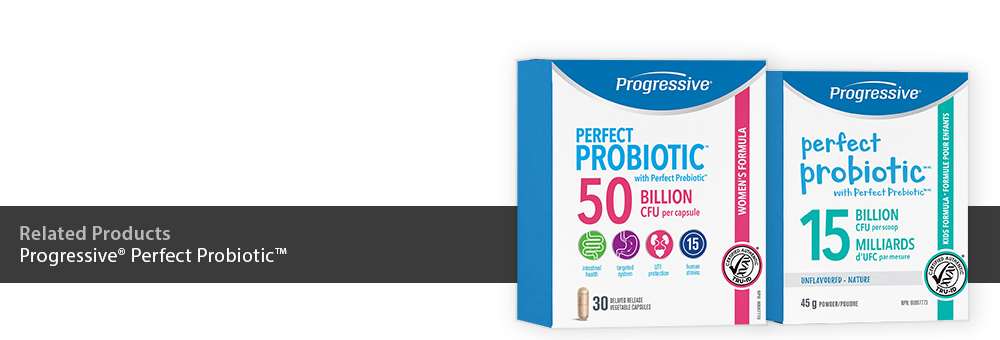

Change how you think about probiotics
When you think about probiotics, do your thoughts meander to your digestive tract? It makes sense: your intestines offer up about 250 square metres of living space for bacteria to call home. But your ability to host bacteria extends far beyond your digestive tract. Important, too, is the impact that bacteria can have throughout the body, no matter where they call home.
Gut reaction
Your gut is connected to your central nervous system, including your brain and spinal cord, via the enteric nervous system (ENS). Your ENS is a system of nerves that are embedded in the lining of your digestive tract from top to bottom. Gut bacteria directly stimulate the ENS via the vagus nerve, and through this pathway are able to influence mood and behaviour.1 Changes in the gut microbiome influence the stress response, mood, sleep and long-term memory for emotional stimuli. Bacterial overgrowth may lead to increased intestinal permeability, which can disrupt normal neuroendocrine regulation and lead to low grade systemic inflammation. Low grade inflammation has been recently associated to the genesis and severity of symptoms of major depressive disorder.2
Fortunately, a meta-review of randomized control trials found that, alone or in multi-strain preparations, Bifidobacterium longum, Bifidobacterium breve, Bifidobacterium infantis, Lactobacillus helveticus, Lactobacillus rhamnosus, Lactobacillus plantarum, and Lactobacillus casei were able to improve anxiety, depression, and behaviours related to memory in animal studies.3 Other research shows that probiotics reduce inflammation and improve depressive symptoms in patients with inflammatory conditions (i.e., IBD, IBS, and rheumatoid arthritis).4 Other research shows that Bifidobacterium longum has an anxiolytic or anti-anxiety effect.5
Urogenital health
Lactobacilli bacteria are the most common species present in the vaginal mucosa of healthy women. Although researchers have not identified the precise reason, the composition of microbiota can change quickly and can lead to bacterial vaginosis, which is characterized by a depletion of lactobacilli and an increase in pathogenic bacteria. Urinary tract infections (UTI) also result from pathogenic bacteria that travel from the vagina and replicate on the epithelium that lines the urinary tract. Women who are post-menopausal are most prone to urogenital infections.
Oral probiotics may help to prevent and provide relief from urogenital infections. Research shows that supplemental Lactobacilli play a role in preventing infection for women with recurrent UTI. Specifically, Lactobacillus reuteri and Lactobacillus rhamnosus have been found to promote an increase in indigenous vaginal lactobacilli in women with vaginosis.6
Body composition, metabolism and healthy lipids
The microbiota of obese individuals in markedly different than lean people, and researchers are investigating the possible reasons. There might also be a link between intestinal bacteria, leaky gut and the chronic low-grade inflammation induced by a high-fat diet that leads to insulin resistance and oxidative stress. Insulin resistance is part of metabolic syndrome and type 2 diabetes.
In a six-month study, researchers saw an improvement in insulin resistance and a decrease in glucose and insulin in participants who used a combination of Bifidobacterium and Lactobacillus bacteria. Significantly, researchers suggested that takes time for the results to show, which might explain why some research into probiotic benefits does not provide the results we would expect!7
Probiotics may also influence on cholesterol. Researchers found that a blend containing Bifidobacterium longum, Bifidobacterium lactis, and Bifidobacterium breve as well as Lactobacillus reuteri and Lactobacillus plantarum has the potential to reduce serum total cholesterol, triglycerides, and LDL-cholesterol (which is the unhealthy cholesterol) in animals. A pre-clinical study also found evidence that Bifidobacterial bifidum and Bifidobacterium breve may exert cholesterol-lowering action.8
Obviously, diverse species of probiotics confer different benefits, so you need to be sure that the probiotic supplements you choose are able to target your concerns. But what if the species listed on the label don’t match what’s in the capsule?
Choosing the Perfect Probiotics
Progressive Perfect Probiotics is the world’s first TRU-ID certified probiotic family. TRU-ID is a breakthrough, independent DNA certification program founded on research and development from the University of Guelph. In a similar way that DNA is used to understand the origins and unique traits of humans, the DNA in our probiotics undergoes rigorous analysis to verify the identity of the species listed on the label. Once the results are independently verified as correct, our probiotics qualify to proudly display a Certified Authentic TRU-ID logo.
It has never been easier to be enjoy the benefits of a one-a-day, high potency, multi-human-strain probiotic formula that is tailored to your individual needs – whether you are concerned about digestive issues, urogenital health or general health and well-being.
References:
1 Galland, L. (2014). The gut microbiome and the brain. Journal of Medicinal Food, (12), 1261.
2 Rao, M., & Gershon, M. D. (2016). The bowel and beyond: the enteric nervous system in neurological disorders. Nature Reviews Gastroenterology & Hepatology, (9), 517. https://doi.org/10.1038/nrgastro.2016.107
3 Wang, H., In-Seon Lee, I-S., Braun, C., & Enck, P. (2016). Effect of Probiotics on Central Nervous System Functions in Animals and Humans: A Systematic Review. Journal of Neurogastroenterology & Motility, 22(4), 589–605.
4 Park, C., Brietzke, E., Rosenblat, J. D., Musial, N., Zuckerman, H., Ragguett, R.-M., … McIntyre, R. S. (2018). Review Article: Probiotics for the treatment of depressive symptoms: An anti-inflammatory mechanism? Brain Behavior and Immunity, 73, 115–124.
5 Arboleya,S., Watkins,C., Stanton, C., & Ross, P. (2016). Gut bifidobacteria populations in human health and aging. Frontiers in Microbiology, Vol 7, 1-9.
6 Jean M. Macklaim, Jose C. Clemente, Rob Knight, Gregory B. Gloor, & Gregor Reid. (2015). Changes in vaginal microbiota following antimicrobial and probiotic therapy. Microbial Ecology in Health and Disease, Vol 26, 1-8
7 Sabico, S., Al-Mashharawi, A., Al-Daghri, N. M., Wani, K., Amer, O. E., Hussain, D. S., … McTernan, P. G. (2018). Randomized Control Trials: Effects of a 6-month multi-strain probiotics supplementation in endotoxemic, inflammatory and cardiometabolic status of T2DM patients: A randomized, double-blind, placebo-controlled trial. Clinical Nutrition. https://doi.org/10.1016/j.clnu.2018.08.009
8 Bordoni A, Amaretti A, Leonardi A, et al. Cholesterol-lowering probiotics: in vitro selection and in vivo testing of bifidobacteria. Applied Microbiology & Biotechnology. 2013;97(18):8273-8281. doi:10.1007/s00253-013-5088-2.

